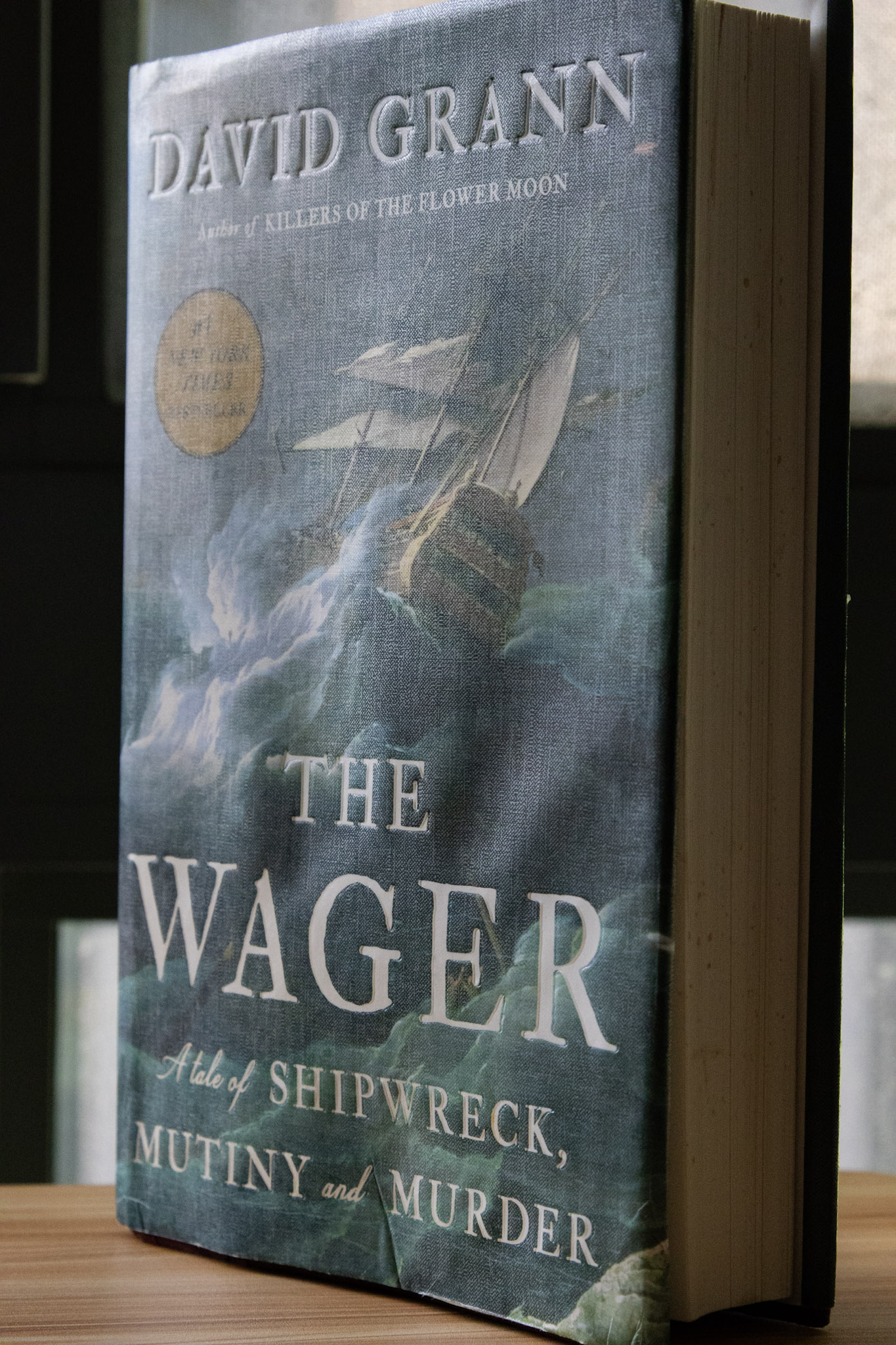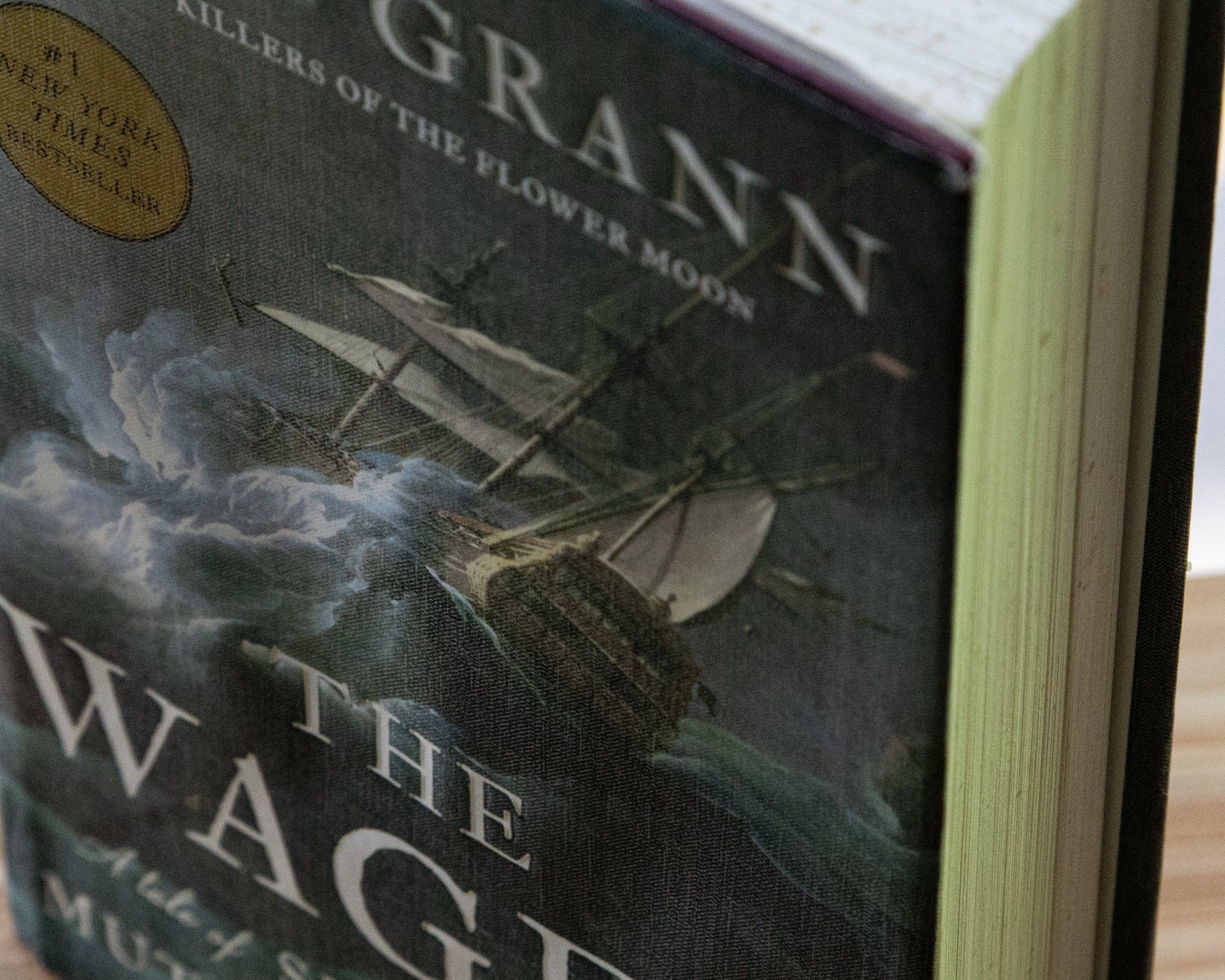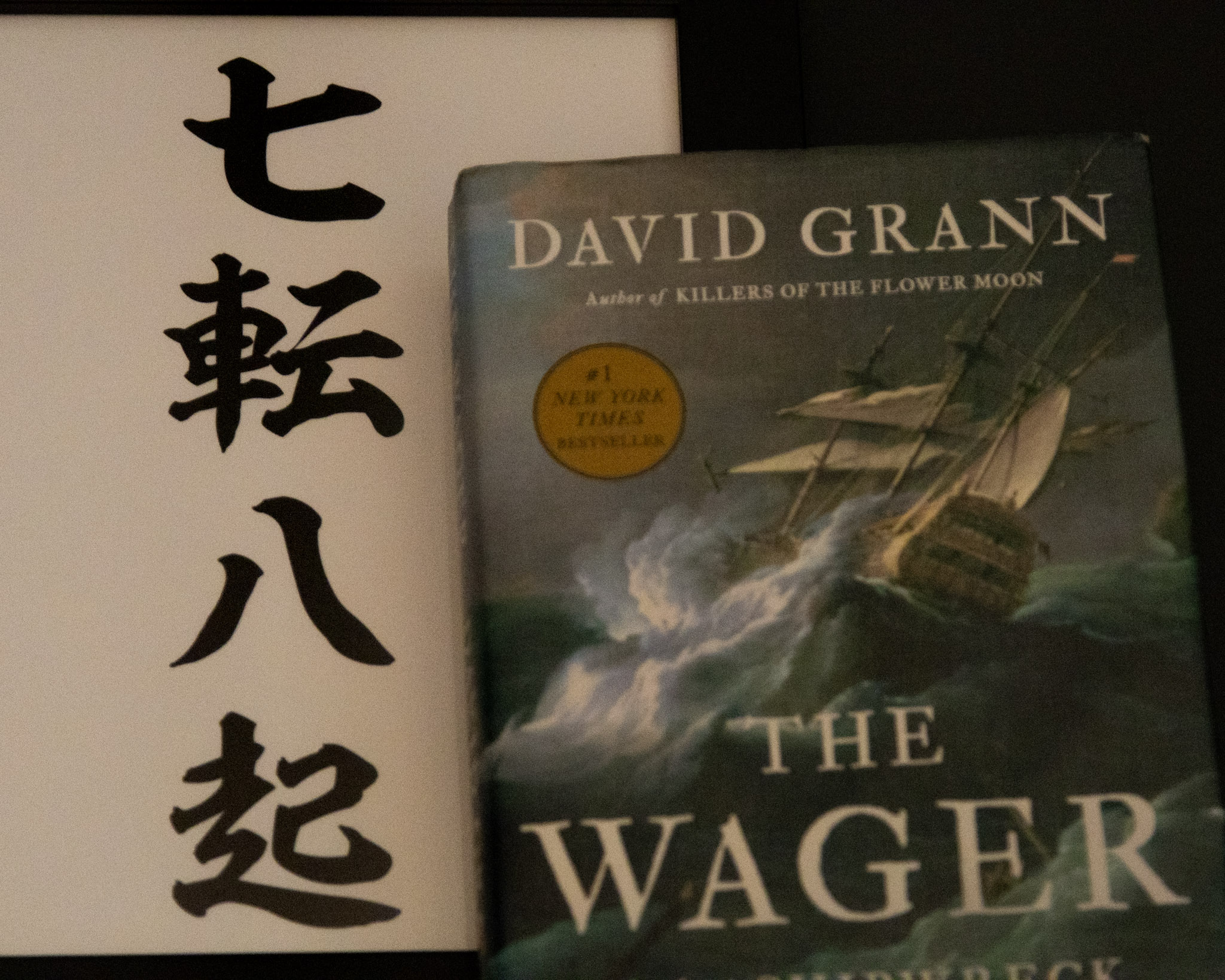Imagine being stranded on a barren island, surrounded by starving, desperate men — some turning to savagery, others clinging to order. In this chaos, one man stood firm in his convictions: John Bulkeley. His story is not just one of survival, but of moral defiance against despair.
Introduction 📚
Welcome to this small dive into The Wager by David Grann, a remarkable nonfiction story of survival, mutiny, the human condition, and resilience. Today, I want to focus on one of the most compelling figures in this harrowing true story: John Bulkeley. Through his actions and beliefs, he emerged as a figure of moral righteousness and an early pioneer of Lockean ideals- the very principles that would later define the American spirit. By examining his resilience and unwavering ethics, we can uncover a profound lesson on perseverance and moral integrity in the darkest of times.

My copy of 'The Wager'
Summary of The Wager ⚓
The Wager recounts the real-world events surrounding the wreck of the British warship, HMS Wager, in 1741. The ship was part of a squadron sent to raid Spanish holdings during the War of Jenkins’ Ear — an ill-fated conflict that ultimately accomplished little. They had embarked on a journey to capture a Spanish naval ship in the Pacific Ocean, quite similar to the premise of The Master and Commander, but entirely nonfiction. After an arduous journey across the Atlantic, the fleet rounded the treacherous Cape Horn. But soon after, disaster struck — The Wager was separated and wrecked on a desolate island off the Chilean coast, which today we call Wager Island.
What followed was a brutal test of human endurance, where starvation, mutiny, and the struggle for survival exposed the rawest elements of human nature.
As the survivors splintered into factions, a striking contrast emerged between those who succumbed to base savagery and those who upheld their principles. Among them were John Byron, David Cheap, and, most notably, John Bulkeley, who stood out as a beacon of integrity and leadership.

Closeup of the ship depicted on the book's cover
Two Leaders Clash
Captain David Cheap
The captain of the HMS Wager at the time of the wreck was David Cheap. He did not begin the journey as the Wager’s captain — or even as one of its crew. Rather, he embarked on this voyage as a lieutenant on a separate ship and after some deaths of the fleet's officers, he was promoted and given charge of the HMS Wager months after the voyage began. This sudden elevation in rank meant he had no deep rapport with his crew, nor had he earned their respect through experience with them.
Cheap was unwavering in his discipline and downright stubborn in his commitment to accomplishing the mission given to him by the fleet's commander, even when it became clear that survival should have taken precedence. His rigid adherence to naval hierarchy and protocol made him blind to the realities of the situation. When the Wager wrecked, rather than adapt to the chaos, he clung to his authority with an iron grip, insisting that the mission was still paramount. He refused to acknowledge the desperate state of his men and made irrational decisions, including attempting to reassert control over his starving, desperate crew through sheer force of rank rather than practical leadership.
His incompetence was further exacerbated when he was shot in the face during a mutinous confrontation, leaving him severely wounded and in even less control of the situation. Despite his injuries and the crumbling state of his command, he remained fixated on enforcing naval discipline, even ordering executions in a futile attempt to reestablish order. His refusal to listen to reason and his inability to command through anything other than fear made him an ineffective leader in the direst circumstances.
Although an admirable leader in many ways, Cheap serves as a cautionary example of authority granted purely through rank rather than merit. His leadership stood in stark contrast to that of John Bulkeley, whose command was forged through necessity, admiration, and reason.
John Bullkley
John Bulkeley was the ship’s gunner—a man of modest rank but immense conviction. In the lawless chaos that followed the wreck, he emerged as a leader not by virtue of his position but through his ability to inspire trust, make rational decisions, and uphold order when traditional naval hierarchy had collapsed. Recognizing that survival was paramount, Bulkeley took command of a faction of survivors who rejected Cheap’s futile insistence on continuing the mission and refused to succumb to the violence and degeneracy that overtook others.
Unlike Captain Cheap, who clung to his rank even as his authority crumbled, Bulkeley believed leadership had to be earned through action rather than imposed through fear. He championed principles that foreshadowed Enlightenment ideals—self-determination, resistance to tyranny, and governance based on reason rather than blind obedience. His careful documentation of events in a journal would later serve as a crucial testimony against the injustices and cruelty suffered during the ordeal, further cementing his legacy as a leader of principle rather than position.
The Remarkable Character of John Bullkley ⭐
What makes Bullkley such an extraordinary figure goes far beyond his role in the Wager's story. His character was forged through a combination of professional expertise, unwavering faith, and moral conviction that made him a natural leader even in the most desperate circumstances.
The Gunner's Expertise and Natural Leadership ⚔
As the ship's gunner, Bullkley held a position of significant responsibility despite not being an officer. The gunner on an 18th-century naval vessel was far more than just someone who fired cannons—he was the custodian of the ship's primary weapons, responsible for maintaining complex equipment and managing dangerous explosives. This role required extensive technical knowledge, experience, and the ability to command respect from the crew working under him.
On Wager Island, Bullkley's practical skills proved invaluable. While others succumbed to despair or infighting, he constantly worked to improve their situation—building shelters, devising ways to collect food, and eventually planning their escape. His problem-solving mindset and work ethic naturally drew others to him. They followed not because of his rank, but because his actions demonstrated competence and a path forward when all seemed lost.
Unwavering Faith Amid Chaos 🙏
Perhaps most remarkable was Bullkley's steadfast Christian faith throughout the ordeal. In conditions where many abandoned all semblance of civilization and morality, Bullkley maintained his religious practices with unwavering devotion. He would hold prayer services, even when it required additional effort after exhausting days of survival work. His Bible remained one of his most treasured possessions throughout the journey.
This faith wasn't merely personal—it informed his ethical decisions and treatment of others. When food was scarce, he advocated for fair distribution. When some survivors turned to violence or theft, he maintained peace and fairness. His faith provided more than just personal comfort, or cope as some would say. It was a moral framework that guided his leadership when naval regulations no longer applied.
Compassion in Crisis ❤️
While Captain Cheap became increasingly isolated and focused on maintaining his authority, Bullkley consistently demonstrated concern for the welfare of others. He tended to the sick, shared what little he had, and made decisions with the collective survival in mind. This compassion extended even to those who disagreed with him—a remarkable quality in such dire circumstances.
When the group finally split and Bullkley led the construction of a makeshift vessel for escape, he ensured that as many men as possible could join the journey, refusing to abandon those who had placed their trust in him. This compassionate leadership stood in stark contrast to the self-preservation that dominated many others' actions. Although he did abandon Cheap, and a small group of fellow surviviors later on, from all accounts it seemed out of sheer necessity, and he wasn't free of guilt himself.
Challenging the Rigid Social Hierarchy :scales:
Perhaps Bullkley's most revolutionary act came after his incredible journey to safety. Upon returning to England, he faced potential court-martial for mutiny. Instead of accepting his fate, he documented his experiences in a journal that would later be published as "A Voyage to the South Seas, in the Years 1740-1."
This account was remarkable not just for its content but for its style. Unlike the flowery, self-aggrandizing narratives typical of aristocratic writers of the time, Bullkley wrote with straightforward honesty and practical detail. His writing was accessible and compelling, allowing common people to understand the injustices that had occurred. Academics have since praised the work for its clarity and authenticity—qualities that stood in direct opposition to the verbose, grandiose style favored by the British aristocracy.
Through this written account, Bullkley not only defended his actions but challenged the very social structure that placed blind obedience to rank above competent leadership and human dignity.
Bullkley and Lockean Ideals 💭
What makes Bullkley's story even more fascinating is how his actions embodied John Locke's philosophies before they were widely adopted in revolutionary thought. He rejected arbitrary rule, advocated for the rights of the men under his command, and navigated the fine line between survival and ethical integrity.
Locke argued that individuals possess inalienable rights — life, liberty, and property — and that governments exist to protect these rights rather than to impose tyranny. Bullkley, in his own way, lived these ideals. He recognized that leadership should be based on competence and moral responsibility rather than rigid hierarchy. He made decisions not just for survival but for the preservation of human dignity amid horror. In a sense, Bullkley was practicing a form of proto-democracy — he led through the consent of those who followed him, rather than by demanding obedience.
His successful navigation home in a small, jury-rigged vessel—a journey considered one of the most remarkable feats of seamanship in naval history—demonstrated that competence and collective determination could overcome seemingly impossible odds. This triumph of skill and will over arbitrary authority perfectly encapsulated the Lockean ideal that legitimate power derives from demonstrated ability rather than inherited or assigned position.
Drawing Inspiration from Bulkeley 🌟
It is easy to read a story like The Wager and recoil at the depths of human depravity on display. The betrayal, cruelty, murder — all reminders of how fragile human civility can be when tested. But rather than focusing on the darkness, I urge you to focus on a light that boldly contrasts and fights against this oppressive abyss of darkness — Bulkeley, a man who chose to stand firm against what he believed to be dangerous tyranny as well as the savagery of his fellow shipwrecked comrades.
In our own lives, we face trials — perhaps not shipwrecks or starvation, but struggles that test our endurance and moral fiber. Addiction, loss of loved ones, failing courses in school, getting laid off, pain, or whatever.
When those moments arise — when your life's ship struggles through rough freezing waters, when it wrecks leaving you stranded on a desolate, remote island, when you are stripped of comfort and are starving, when you're surrounded by depravity and suffering, when the odds are overwhelmingly stacked against your favor — try to draw inspiration from John Bullkley's actions.
Ask yourself: "What would Bulkeley do? Would he surrender to despair, or would he uphold his values against overwhelming odds? Would he take on the burden of leadership to ensure not just his survival, but that of others?"
Just as Bulkeley navigated the perils of Wager Island, we too can navigate our own trials — our own Wager Islands — with virtue and resilience.
I urge you to reflect on your own figures that stick out to you for inspiration. We each have our own heroes and figures of hope. These don't even need to be real people. I often think of fictional characters such as Alyosha from The Brothers Karamazov or Guts from Berserk. Let them be your guiding light.
Stay true to yourself, keep your moral compass pointed north, and take every step you can to live virtuously and nobly even in the worst of times.

"Nana Korobi Ya Oki" - "Fall seven times, stand up eight"